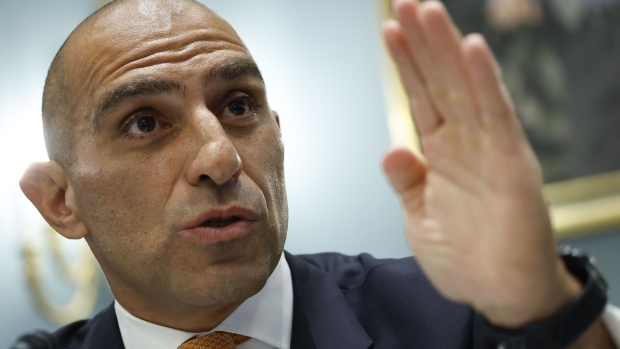Oct 6, 2023
US Regulators Weigh Penalizing Bankrupt Crypto Lender Voyager’s Ex-CEO
, Bloomberg News

(Bloomberg) -- Investigators at a key US regulator have concluded that the co-founder of Voyager Digital Ltd. broke derivatives regulations before the failed crypto lender plunged into bankruptcy last year, according to people familiar with the matter.
Staff in the Commodity Futures Trading Commission’s enforcement division recommended internally that the agency accuse Stephen Ehrlich of breaking its rules by misleading customers about the safety of their assets following a probe into Voyager’s conduct. CFTC commissioners are now voting on whether to approve an enforcement action against him within days, said the people, who asked not to be identified discussing the confidential deliberations.
The CFTC can seek fines and impose other non-criminal penalties on those it accuses of wrongdoing. The agency, whose investigations don’t always result in enforcement actions, declined to comment. Voyager disclosed in August 2022 as part of its bankruptcy case that the CFTC had sought information related to its business, customers and lending activities.
Ehrlich, who was also chief executive officer when Voyager filed for bankruptcy in July 2022, has not been formally accused of any wrongdoing. In an emailed statement, he said he was “angered and perplexed” by the government’s anticipated civil claims and called them unfounded.
“Day in and day out, Voyager worked closely with the relevant regulators,” he said. “These allegations appear to be one of those times where the referees are making new rules and calling foul after the game has ended. I look forward to being vindicated in court.”
Separately, the Federal Trade Commission, which has authority over consumer protection, said in February that it opened an investigation into the company and its employees, directors, and officers over “deceptive and unfair marketing of cryptocurrency to the public.”
US regulators last year demanded Voyager remove any statements indicating that customers’ dollar deposits were covered by federal deposit insurance. They said those claims were false.
Read More: US Demands Voyager Clarify Client Funds Are Not FDIC Insured
Paul Hage, an attorney who is administering Voyager’s wind-down, said in a statement on Thursday that earlier this week he signed off on a settlement with the FTC over the agency’s claims that Voyager misrepresented the availability of Federal Deposit Insurance Corp. protection to its former customers.
Hage said that as plan administrator, he didn’t admit to or deny the allegations on behalf of Voyager. Such consent orders are typically subject to the approval of the FTC’s commissioners. The FTC declined to comment.
Interconnected Market
Voyager’s bankruptcy was one of biggest events in a wild 2022 that culminated with the collapse of crypto trading giant FTX. The industry is still reeling, and FTX co-founder Sam Bankman-Fried’s criminal trial began this week in New York.
The tumultuous year exposed the extent of interconnectedness among the market’s major players. Before Voyager’s downfall, one corner of Bankman-Fried’s empire borrowed from and lent money to Voyager, and FTX’s US business even sought to buy it in bankruptcy before FTX itself collapsed just months later.
At its height, Voyager played a large role in the US digital-asset market. Before the Federal Reserve started raising interest rates, crypto lenders attracted tens of billions of dollars in deposits by promising yields that far exceed those available through traditional savings accounts.
Read More: What’s Crypto Lending? Why Did Investors Get Burned?: QuickTake
In the case of Voyager, the CFTC investigators found the firm told customers their assets would be safe, but at the direction of Ehrlich, allegedly transferred hundreds of millions of dollars to high-risk companies, including crypto hedge fund Three Arrows Capital and Bankman-Fried’s Alameda Research, said the people. Three Arrows and Alameda eventually imploded.
The agency’s probe determined that Ehrlich didn’t conduct proper due diligence on Three Arrows before lending the firm more than $650 million worth of customers’ Bitcoin and US dollars, said one of the people. That loan was never repaid and played a large role in the company’s downfall.
--With assistance from Lydia Beyoud, Katanga Johnson, Leah Nylen and Jeremy Hill.
©2023 Bloomberg L.P.





